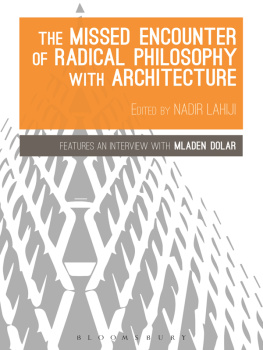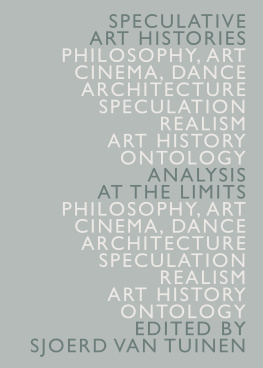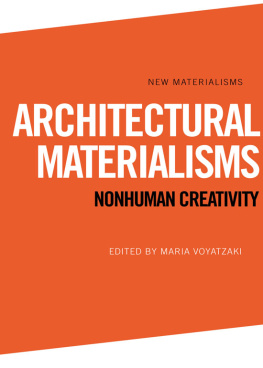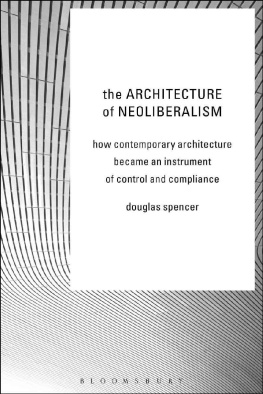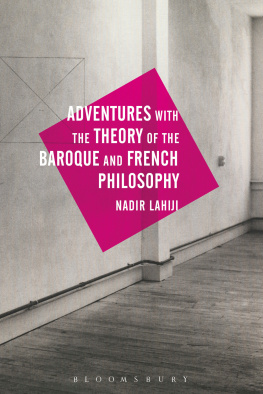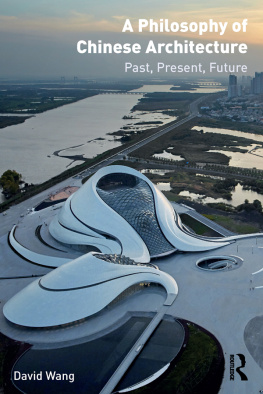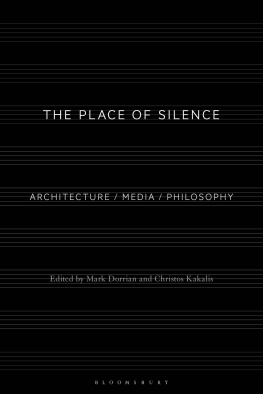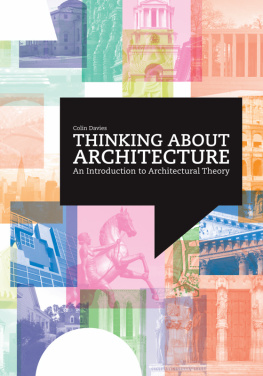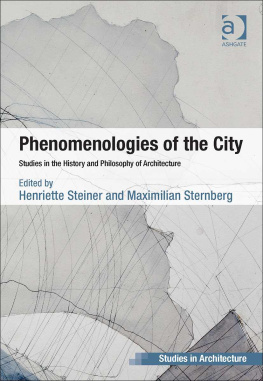The Missed Encounter of Radical Philosophy with Architecture
Also available from Bloomsbury
Aesthetics and Architecture, Edward Winters
Aesthetic and Artistic Autonomy, edited by Owen Hulatt
Aesthetics: Key Concepts in Philosophy, Daniel Herwitz
Aesthetics: The Key Thinkers, edited by Alessandro Giovannelli
Architecture in Black, Darell Wayne Fields
Art, Myth and Society in Hegels Aesthetics, David James
Art, Politics and Rancire: Seeing Things Anew, Tina Chanter
Deleuze and the Schizoanalysis of Visual Art, edited by Ian Buchanan and Lorna Collins
The Missed Encounter of Radical Philosophy with Architecture
Edited by
Nadir Lahiji
Bloomsbury Studies in Philosophy

for Nayere...
Contents
Rex Butler is Reader in Art History in the School of English, Media Studies and Art History at the University of Queensland. He writes on both theory and visual art. His most recent book is the edited Jeremy Gilbert-Rolfe: Art After Deconstruction (Edition 3). He is currently completing A Readers Guide to Deleuze and Guattaris What is Philosophy?
David Cunningham is Deputy Director of the Institute for Modern and Contemporary Culture at the University of Westminster in London, and a member of the editorial collective of the journal Radical Philosophy. He is an editor of collections on Adorno (2006) and photography and literature (2005), as well as of a special issue of the Journal of Architecture on post-war avant-gardes. Other writings on aesthetics, modernism and urban theory have appeared in publications including Angelaki, Architectural Design, CITY, Journal of Visual Culture, New Formations and SubStance. He is currently completing a book on the concept of the metropolis.
Mladen Dolar is Professor of Philosophy at the University of Ljubljana, Slovenia. His main areas of interest are German Idealism, psychoanalysis, contemporary French theory and philosophy of music. He is the co-founder of the Ljubljana School of Psychoanalysis. He is the author of numerous books, including: A Voice and Nothing Else and Operas Second Death (with Slavoj iek).
Hlne Frichot has recently taken up a new position as Assistant Professor in the School of Architecture and the Built Environment, KTH, Stockholm, in the Critical Studies stream. She has co-curated the Architecture+Philosophy public lecture series in Melbourne, Australia (http://architecture.testpattern.com.au) since 2005. Between 200411 she held an academic position in the School of Architecture and Design, RMIT University. Her research examines the transdisciplinary field between architecture and philosophy (while her first discipline is architecture, she holds a PhD in philosophy from the University of Sydney, 2004). Hlne draws predominantly on the philosophical work of Gilles Deleuze and Flix Guattari, alongside other poststructuralist as well as feminist thinkers. Her published research has ranged widely from commentary on the ethico-aesthetics of contemporary digital architecture operating within the new biotechnological paradigm, to the role of emerging participatory and relational practices in the arts, including critical and creative spatial practices. She considers architecture-writing to be her mode of practice. A selection of recent publications include: On Finding Oneself Spinozist: Refuge, Beatitude and the Any-Space-Whatever, in Charles J. Stivale, Eugene W. Holland, Daniel W. Smith eds, Gilles Deleuze: Image and Text (Continuum Press, 2009); Drawing, Thinking, Doing: From Diagram Work to the Superfold, in ACCESS, 30 (2011); What Can We Learn from the Bubble Man and His Atmospheric Ecologies, in IDEA: Interior Ecologies (2011), Following Hlne Cixouss Steps Towards a Writing Architecture, in Naomi Stead and Lee Stickells guest editors, ATR (Architecture Theory Review), 15,3 (2010); edited volume Deleuze and Architecture, EUP, 2013, forthcoming.
Graeme Gilloch is Critical Constellations Reader in Sociology at Lancaster University in the United Kingdom. He has been a visiting research fellow at the Humboldt University in Berlin, at the Johann-Wolfgang Goethe University in Frankfurt am Main (with the support of the Alexander von Humboldt Stiftung) and, most recently, was a visiting research fellow at the Korean Studies Institute of Pusan National University in South Korea. Working in the area of social and cultural theory, his main research focus is the Critical Theory of the so-called Frankfurt School and in particular the writings of Walter Benjamin and Siegfried Kracauer. He is the author of two monographs on Benjamin (Myth and Metropolis 1996 and 2002, both with Polity Press, Cambridge) and numerous articles and book chapters exploring Critical Theory in relation to the writings of other theorists (Roland Barthes, Jean Baudrillard, Friedrich Kittler, Henri Lefebvre, Marc Aug) as well as contemporary filmmakers, artists and writers including, among others, Paul Auster, Orhan Pamuk and W. G. Sebald. The themes of urban experience, memory and visual culture are abiding preoccupations. Dr Gilloch is presently completing a book of essays on Kracauer and an edited collection (with Professor Jaeho Kang of the SOAS, University of London) of Kracauer writings on propaganda and political communication. His work has been translated into French, German, Italian, Polish and Korean and an Arabic edition of Critical Constellations is forthcoming.
Mark Jarzombek, Professor of the History and Theory of Architecture, is currently the Associate Dean of MITs School of Architecture and Planning. He teaches in the History Theory Criticism programme (HTC) of the Department of Architecture. Jarzombek has taught at MIT since 1995. He has published on a wide range of historical topics from the Renaissance to the modern.
Nadir Lahiji is Associate Professor of Architecture at the University of Canberra. He holds a PhD in architecture theory from the University of Pennsylvania. He is the editor of The Political Unconscious: Re-Opening Jamesons Narrative (Ashgate, 2011) and editor of Architecture Against the Post-political: Essays in Reclaiming the Critical Project (Routledge, 2014). He has previously co-edited Plumbing: Sounding Modern Architecture (Princeton Architectural Press, 1997).
Andrew Leach is Associate Professor in the Griffith School of Environment and an Australian Research Council Future Fellow (201216). Among his books are What Is Architectural History? (Polity, 2010), Manfredo Tafuri: Choosing History (A&S, 2007) and the edited volumes Architecture, Disciplinarity and the Arts (A&S, 2009, with John Macarthur) and Shifting Views (UQP, 2008, with Antony Moulis and Nicole Sully).
Joel McKim is a Lecturer in the Department of Film, Media and Cultural Studies at Birkbeck, University of London. He has been a postdoctoral fellow at the Henry Clay Frick Department of the History of Art and Architecture at the University of Pittsburgh and the Department of Art History and Communication Studies at McGill University. He has recently co-edited an issue of the journal Space & Culture on the theme Spaces of Terror and Risk and is working on a book-length project titled Memory Complex: Competing Visions for a Post-9/11 New York. His writing on architecture and conflict, political communication and memorial design, and media and architecture has appeared in the journals
Next page
